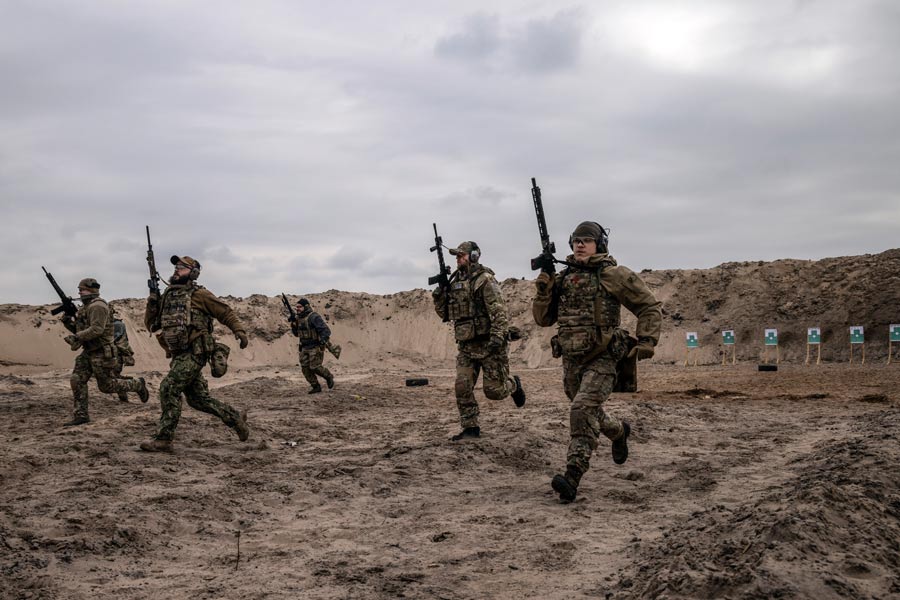For several days in March 2022, the battalion of Yaryna Chornohuz, a Ukrainian poet and combat medic, faced fierce attacks from a column of Russian tanks in southeastern Ukraine. Outgunned, the soldiers repelled the first two assaults but suffered many casualties.
As Chornohuz bandaged the head of a wounded platoon commander, she said a third attack broke through, forcing the Ukrainian troops to retreat quickly, leaving behind the commander and other badly injured soldiers.
“Lots of good guys were killed,” said Chornohuz, 29. “We didn’t have the time to say goodbye to any of them.”
After she reached safety in a village away from the combat zone, she poured her emotions into a poem, typing out verses on her phone.
Every time you want to be wrong
About the brightness of those eyes
The eyes of those who
decided one day
To die in battle
Are always brighter than others’
A year later, Chornohuz sent the poem and others written on the battlefield to a publisher, who released them as a collection in 2023. The book received acclaim, and this year, it won a Shevchenko National Prize, Ukraine’s highest arts and culture award.
Chornohuz’s story is emblematic of a poetry boom that has swept Ukraine during the war with Russia. Over the past two years, poets have emerged as some of the nation’s most popular voices, their verse capturing the raw emotions of the conflict and resonating deeply with a war-weary population.
Sales of poetry books have soared, according to bookshop owners. Ye, a large Ukrainian bookstore chain, reported selling 2.5 times more contemporary poetry books in the first year of the war than in 2021. To meet the surge in demand, major Ukrainian publishing houses like Vivat and Nash Format said they had published poetry for the first time in their histories.
Like Chornohuz, many poets have taken up arms and infused their work with battlefield experiences, with poems recounting the loss of soldiers and the obliteration of cities by Russian bombings.
There is hardly a week that passes in Kyiv, the capital, without the publication of a poetry book or a public reading. In May, Serhiy Zhadan, one of Ukraine’s most famous writers, filled an indoor sports stadium there with fans for a poetry evening.
“Ten years ago, it would have been unimaginable for a poet to fill a stadium,” said Tetyana Ogarkova, a Ukrainian literary scholar. “Poetry has reached the point where it has become a form of mass culture.”
Poetry has long held a special place in Ukraine. The country’s most famous historical figure is Taras Shevchenko, a 19th-century poet whose moustachioed face appears on hundreds of monuments across cities and villages. Ukraine’s 20th-century struggle for independence was also shaped by poets who doubled as political activists, like Ihor Kalynets, a dissident during the Soviet period.
“Literature, poetry in particular, played the role of nation-building in Ukraine,” said Lyuba Yakimchuk, a Ukrainian poet.
Several writers said poetry had proved to be the literary genre best suited to war. Unlike novels, it can be written quickly, allowing poets to react to the daily tragedies of conflict and crystallize fleeting emotions in a few stanzas.
“Poetry has found an audience as a quick response to emotions,” said Dmytro Lazutkin, a poet who was recently appointed as a spokesman for the Ukrainian defence ministry after serving in a frontline brigade.
At the front, Lazutkin said he wrote “during breaks”, jotting down on his phone “images and metaphors that come to my mind, sentences that later become the backbone of the poems.” Some of his work disappeared with the phones he lost on the battlefield. He has published the rest on his Facebook page, garnering hundreds of likes for individual poems.
Lazutkin was also awarded a Shevchenko National Prize this year for poems he wrote before Russia’s full-scale invasion in February 2022. The poems he has written since then have changed radically in style: He has abandoned lyricism and rhymes, writing instead with free verse to document the raw realities of war.
“I needed a new way of expressing myself,” Lazutkin said. “I understood I couldn’t write the way I did before.”
His poems often read like grim diaries of life on the front line. In Final Shot, he recounts the death of a soldier whose leg was blown off in Avdiivka, an eastern city Russian forces captured in February. In Rolling Stones, he tells the story of a comrade who hears from his wife, who has fled to Germany with their children, that she is considering not returning to Ukraine.
The next day he asked the commander
To send him to the outpost to be closer to hell.
Lazutkin and other poets said their matter-of-fact, unadorned style of writing was a way to avoid romanticising the war.
“I don’t want to make evil beautiful and aesthetic,” said Yakimchuk, whose poetry collection “Apricots of Donbas” recounts the early years of the conflict, when Russian-backed forces took control of parts of eastern Ukraine in 2014. In her poem “Decomposition,” she breaks up the names of eastern cities like Luhansk and Pervomaiske to reflect the destruction wrought by the war.
The poems have struck a chord with Ukrainians. In the battered eastern city of Kharkiv, poems have been inscribed on wooden planks covering windows shattered by explosions. Videos of poet-soldiers reading verses from the trenches are popular on social networks, and public readings have drawn crowds — even in dangerous places.
New York Times News Service











